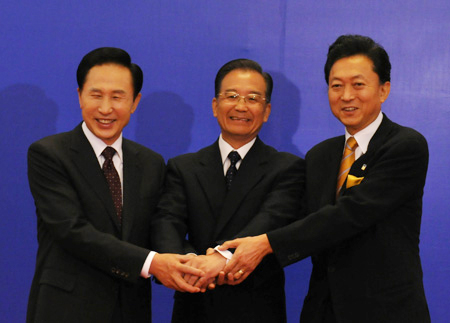Prospects for the East Asia Trilateral Summit
The seventh China-Japan-South Korea summit opens on October 10 in Beijing with the financial crisis, climate change, the Northeast Asia security situation and regional integration on the agenda. Uppermost in the minds of the leaders will be how to build regional stability and prosperity.
 |
| Chinese Premier Wen Jiabao(C), the Republic of Korea (ROK) President Lee Myung-bak (L) and Japanese Prime Minister Yukio Hatoyama poses for a group photo before the second trilateral summit meeting of China, Japan and the ROK in Beijing, capital of China, on Oct. 10, 2009. [Xinhua/Huang Jingwen] |
Tackling the economic crisis will probably top the agenda. The export-oriented economies of Japan, China and South Korea all suffered badly in the crisis. They also have a key role to play in restoring international financial and economic stability. The three sides are likely to discuss how to cooperate on solutions to the crisis within the context of the G20 and other international and regional forums.
As America's two largest creditors, China and Japan are deeply concerned about the stability of the US dollar. They would be the worst hit if the U.S. devalues its currency and passes the costs of its economic predicament to the world. The three countries might discuss Obama Administration's initiative of rebalancing the global economy.
The security situation in Northeast Asia and especially on the Korean Peninsula is a key concern not only for the three countries but for the entire international community. Chinese Premier Wen Jiabao, who just returned from a visit to the DPRK, may give some hints on the future of negotiations on de-nuclearization that are currently trapped in an impasse. South Korean President Lee Myung-bak may say more about his "Grand Bargain" on North Korean denuclearization, and reassure his summit partners that it is more than an attempt to evade South Korea's responsibilities on the issue.
Other regional security issues that may be discussed include maritime boundaries and competing claims to sovereignty over island groups. But these issues are likely to remain shelved until the three countries can agree a mechanism for resolving them. The aim of the summit is to seek agreement and boost cooperation rather than emphasizing differences.
Climate change is likely to figure in the discussions. China signed a memorandum of understanding on climate change, energy and the environment with the U.S. in July. High on the agenda will be how the three countries can work together in the run up to the Copenhagen Conference at the end of the year.
One area where progress is likely is regional economic cooperation. Japan and South Korea are major developed countries and China is the largest developing country in the world. The three countries have been economically interdependent for many years. China is a huge and growing market for Japan and South Korea, who are also major consumers of Chinese products.
The three countries know if they can reach consensus on building regional free trade agreements, East Asia will become one of the most important regions in the global economy. So the leaders are likely to work on removing obstacles to negotiations on regional free trade. All three countries have already made great progress in achieving free trade agreements with the ASEAN countries.
The three countries should take the opportunity of the summit to discuss how to pursue common interests. The so-called East Asia Community will be illusory if it cannot build mutual confidence and trust on regional security issues. The three powers need to work out ways to shelve their differences on security issues. The uncertainty over security on the Korean Peninsula should be seen as an impetus, not an obstacle, to cooperation.
At the same time, the leaders need to find ways to reassure the U.S. and ASEAN. The U.S. may fear the consequences of East Asian integration. If the three countries cooperate on setting the agenda in international economic institutions, the U.S. may feel it is losing its leading role in world affairs. ASEAN may also feel left out as the three countries hold a summit outside the context of ASEAN, and consequently may feel it is losing its influence on the process of East Asian integration.
 0
0 






